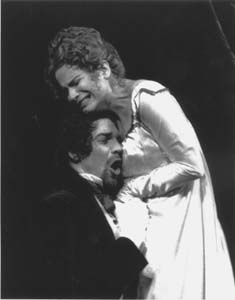![[Metroactive Stage]](/stage/gifs/stage468.gif)
[ Stage Index | San Jose | Metroactive Central | Archives ]
 Love Match: Barbara Divis clinches with Mel Ulrich in 'Eugene Onegin.'
Love Match: Barbara Divis clinches with Mel Ulrich in 'Eugene Onegin.'
Letter Perfect A famous scene gets its just due in Opera San José's production of 'Eugene Onegin' By Michael J. Vaughn THE FIRST TIME I saw the famed Letter Scene from Tchaikovsky's Eugene Onegin, I was frankly disappointed. Though I still drank in the lush vocal lines and orchestrations I knew from recordings, I was dismayed to learn that the dramatic context was basically a teenage girl, Tatyana, staying up all night in her bedroom saying things like, "Oh, I don't know, should I write him? Should I not write him? Do you think he really likes me? Oh! I am so, like, totally filled with angst and stuff!" Thanks to the work of two Opera San José alumni, soprano Barbara Divis and stage director David Cox, Saturday night's Letter Scene was something entirely different. Guided by Cox's energetic attack on a typically moribund Russian libretto (by Konstantin Shilovsky and the composer, based on the novel in verse by Alexander Pushkin), Divis played the scene as if each one of Tatyana's doubts and joys had a name and a face, and she could react to them as if they were right there on stage with her. The 12-minute adolescent roller coaster, veering from window-gazing anxiety to literal pirouettes of infatuation, suddenly came alive--and helped rather than hindered the music. Divis also displayed an impressive depth of tone in the lower end and provided a gateway to the second, more passionate section with the stunningly quiet wish, "and whispers of hope." Another particular challenge is making something out of the title character, who, deprived of background, seems determined to descend from one level of jerkdom to another without giving us the slightest explanation. He begins by refusing Tatyana's affections in the cruelest manner possible ("Your perfection would be wasted on me"); then shows up his best friend, Lenski, in front of Lenski's fiancée; then finishes by trying to steal the aging Gremin's sole joy in life, his young bride. This daunting task falls to yet another OSJ alumnus, baritone Mel Ulrich, who spends time these days performing roles at the Met. Ulrich not only succeeds in his task, he somehow manages to make Onegin sexy. The man's a star. As Lenski, Thomas Truhitte displays a tenor that continues to grow more and more robust, most notably in Lenski's lovely preduel aria, "Kuda, kuda vi udalilis" ("Whither, ah! whither are ye fled"). Truhitte's only flaw lies in his single-forte dynamic, where he often displays a forced metallic edge in his tone. Another vocal treat is bass-baritone Christopher Dickerson's reading of Gremin's tribute to his young wife, "Lyubvi vsye vozrasti pokorni" ("To love all ages are obedient"). And, though his singing is a little unsteady, tenor Christopher Fernandez gives a priceless Liberace rendition of the town character, Monsieur Triquet. The orchestra seems to take great pleasure in Tchaikovsky's lyrical writing, with only an occasional sourness in the strings to detract. Conductor David Rohrbaugh shows great flexibility with his singers, allowing Truhitte, for instance, to draw out some lovely sustenatos at the ends of his phrases. Joe Ragey's 1995 sets are nothing spectacular, but for some reason the most effective is the simplest, as in the single balustrade and burgundy draping that create Gremin's reception room. Cox's playful side shows itself at its best in the second-act ballroom scene, wherein he freeze-frames Onegin's snoopy onlookers in rhythm with the music.
Opera San José presents Eugene Onegin Sept. 15-16, 19, 21, 23, 28-29 at 8pm and Sept. 17, 24 and Oct. 1 at 3pm at the Montgomery Theater, San Carlos and Market streets, San Jose. Sung in Russian with English supertitles and alternating casts. Tickets are $40-$54. (408.437.4450) [ San Jose | Metroactive Central | Archives ]
|
From the September 14-20, 2000 issue of Metro, Silicon Valley's Weekly Newspaper.
Copyright © 2000 Metro Publishing Inc. Metroactive is affiliated with the Boulevards Network.
For more information about the San Jose/Silicon Valley area, visit sanjose.com.